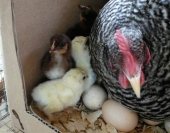




 2
2




"Study books and observe nature; if they do not agree, throw away the books." ~ William A. Albrecht




 2
2




 2
2




Maureen Atsali
Wrong Way Farm - Kenya













"Study books and observe nature; if they do not agree, throw away the books." ~ William A. Albrecht




James Freyr wrote:Raising chickens myself I will share with you my observations. Every time one of mine has gone broody, there's been 8-12 eggs under her the day she went broody. I don't have a rooster and don't want broody hens, I want laying hens. If I catch them in time, and pull them off the eggs and distract them several times the first day, I've managed to have a few change their mind about being broody. The one biggest single identifier (for me in my cases) of determining if a hen is going broody is she will be in the nesting box at sundown and spend the night in there instead of on the roosting bar.
Another observation I've had with my flock and with friends flocks and talking with them is regular egg collection seems to keep (for the most part) hens from going broody. If I miss a day collecting eggs and there are nesting boxes full of eggs, it seems a hen is more likely decide to go broody and sit. None of what I have said is science, it's just what I've noticed. I have also, in my experience, never had a hen go broody in the fall when the flock is molting, or go broody during the short cold days of winter.

|
All of the following truths are shameless lies - Vonnegut
Freaky Cheap Heat - 2 hour movie - HD streaming
https://permies.com/wiki/238453/Freaky-Cheap-Heat-hour-movie
|


